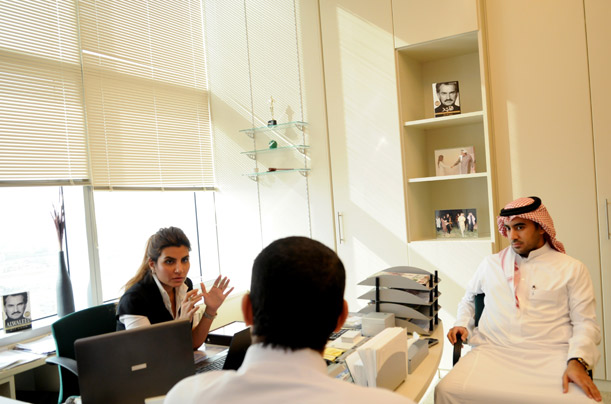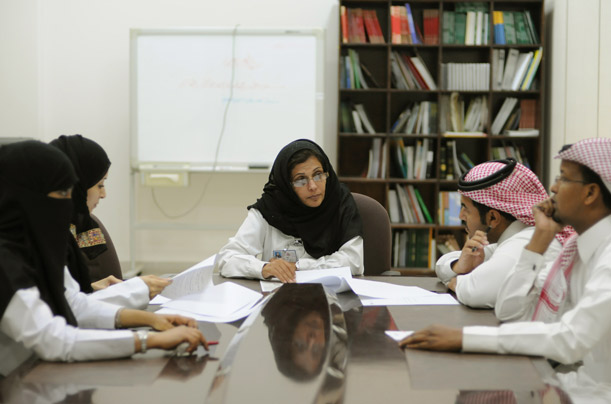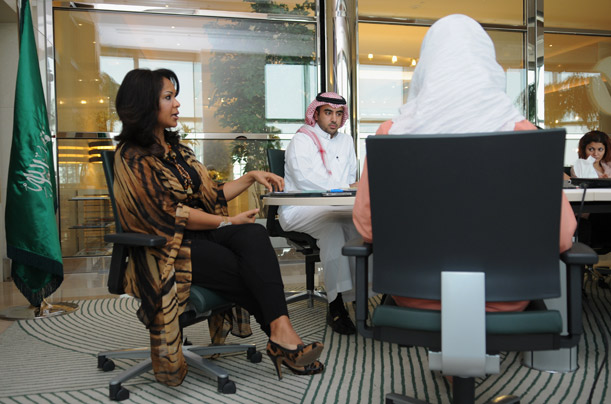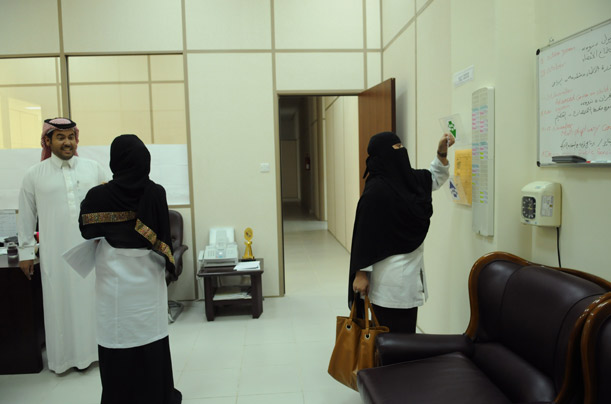A gallery at Time Magazine offered a set of photographs that counter the frequent representations of Saudi women as (veiled) and downtrodden. The slide show features professional women at work.
Daneh Abuahmed, Rotana’s head of information technology:

Dr. Maha Al Muneef, Executive Director of the National Family Safety Program:

Sultana al Rowaili, the head of human resources at Rotana:

Members of the National Family Safety Program:

Norah Al Malhooq, administrator King Faisal Specialist Hospital and Research Centre:

—————————
Lisa Wade is a professor of sociology at Occidental College. You can follow her on Twitter and Facebook.

Comments 91
John Stark — October 13, 2009
Awesome, it's only mostly oppressive, not completely. Thanks for the heads up!
George — October 13, 2009
It's good that there are certain institutions, evidently hospitals and this Rotana corporation, where perhaps women enjoy some equality with men. That's an excellent trend, and I hope it continues.
In general the grotesque treatment of women in Saudia Arabia is well documented. This treatement is codified in their legal system. You can find examples in the news every week of some woman jailed for driving, or going for coffee with an unrelated male, or being flogged for having the audacity to be raped (clearly tempting some men into their crime). Those frequent representations need not be "countered", they are accurate representations.
I would not expect to find what appears to be a defense of Saudia Arabia, or at least the implication that what we know is some kind of propaganda, from people who so often find fault with the vague remnants of western patriarchy.
Jillian C. York — October 13, 2009
While I appreciate this story, the women who work at Rotana are only unable to shake off their headscarves (hijab) because Rotana HQ is in the UAE, not Saudi Arabia. Saudi Arabia's women are educated, and they do work, but that doesn't change the fact that they're not allowed to go out alone, unveiled, or drive a car.
Deaf Indian Muslim Anarchist — October 13, 2009
John:
"Awesome, it’s only mostly oppressive, not completely. Thanks for the heads up!"
Uh, you do realize that a lot of Muslim women (both in the West and non-Western/Muslim nations) make the CHOICE to wear hijab and cover themselves, right? Where's your right for women to cover themselves up? So it's OK for women to wear a bikini, but it's not OK to wear hijab or an abaya.
Typical.
Duragn2 — October 13, 2009
@Deaf Indian Muslim Anarchist
Are you arguing that Saudi Arabia is NOT oppressive toward women? I'd LOVE to see you defend that point. Right here. On this thread. Go.
Josh Berliner — October 13, 2009
@DIMA
You are right that many women in the West choose to cover up.
So why doesn't Saudi Arabia let the women choose to cover up?
Therein lies the oppression.
Lost Left Coaster — October 13, 2009
Whenever there is a dominant narrative, such as, "women in Saudi Arabia are hopelessly oppressed," it is good to add some complexity to the discussion, not to refute the previous narrative, but just to give a more complete picture. This photo gallery by no means denies nor refutes the idea that women in Saudi Arabia are oppressed; this is objectively true. But it gives a more complete picture: there are women in Saudi Arabia that work at a professional level. This is something that is not often taken into consideration.
I'm a little surprised at the comments that reflect the idea that somehow this blog is now defending the oppressive patriarchy of Saudi Arabia simply by showing photographs of professional women at work. I guess you think it would be better for these women to not be shown because they do not fit neatly within the dominant narrative? Should we ignore the hard work and sacrifices that these women have doubtlessly had to endure in order to get to where they are today?
Surely we can discuss Saudi Arabia's overall awful treatment of women without having to suppress images such as those shown here.
Craig — October 13, 2009
Usually, pictures that seek to put a happy face on an underlying inequity come in for harsh words on this blog. As much fun as I have pushing back against what I see as some of the excesses, I find this questioning, challenging, digging both valuable and illuminating.
The treatment of women in Saudi Arabia is genuinely grotesque. As happy as I am to hear of a single company that not only employs women but permits them to have their faces uncovered while inside the corporate offices, I'm astonished--really flabbergasted--to see Sociological Images blandly pass this item along as "a set of photographs that counter the frequent representations of Saudi women as (veiled) and downtrodden."
One reason, perhaps, that Saudi women are represented as veiled is because, you know, they are _legally_required_to_be_veiled_ whenever they walk out of doors. They can quite literally be beaten on the streets for "immodest behavior."
Some of the reasons they might be thought of as downtrodden--they are not permitted to drive cars; their freedom of movement and travel is highly constrained; they are not permitted to vote in municipal elections; they are not permitted to give testimony in court except in special circumstances. I don't even want to talk about female genital mutilation, because it makes me sick and very sad.
One could go on. At least Saudi women are permitted to have their own identity cards nowadays, instead of being mentioned on a male relative's. Progress!
I wish some more critical thought had been directed at this item. Time magazine should be ashamed for this happy-happy whitewash. Sociological Images shouldn't be inclined to play along.
Alyssa — October 13, 2009
I don't think this post is about the oppression in the Saudi culture. It is one step removed from that. This post is about OUR perception of the Saudi culture. In the US and most Western countries we hear Saudi (or anything Middle Eastern) and think oppression. As a result we tend to treat female immigrants from the Middle East as oppressed and male immigrants from the Middle East as oppressors without exception. This usually ends in racist commentary and/or actions (see France's ban on burkas for example).
This post shows the flaw in that thinking. It's not trying to say there isn't oppression (or that oppression isn't that bad) in the Middle East (the fact that there is oppression goes without saying). Rather it is saying it isn't 100% true for 100% of the population. There are some Saudi women with power. It's saying that we need to actually look at the situation before assuming that there is oppression when we hear Middle East.
Anamia — October 13, 2009
I actually don't think these images serve to counter the common representation of women in Saudi Arabia as opressed. Rather, I interpret it to be a reinforcement of the sentiment veils = bad and opressive, and in the opposite end, at least some of the images could be interpreted to spouse the wide-spread belief that womens' integration into capitalist business is 'liberating' (ie. moving women forward into typically western way of behaving and dressing).
And frankly, I think it's rather astonishing that a post like this could end on a blog dealing with sociology without a single mention of the fact that these women are clearly from at least upper-middle class.
Rose — October 13, 2009
"the women who work at Rotana are only unable to shake off their headscarves (hijab) because Rotana HQ is in the UAE, not Saudi Arabia"
Was this meant to say "only ABLE"?
John — October 13, 2009
Oh my god, look at all those men forced to wear traditional dress. Why are women apparently allowed to wear something other than a long white gown and red-checked headgear held on by a black band?
Part of this is snark, but it's interesting that no one seems to have brought up the uniformity of all the men's clothing (save possibly for two men, both not in focus in the photos). Yes, I understand that there are many issues relating to women, the subjugation of women through particular garments, etc. But take another look at the [LACK] of diversity of clothing options apparently allowed to the men.
facts — October 13, 2009
Hey people, get your facts straight - FGM is not common in Saudi Arabia - that would be Egypt, Sudan, sub-Saharan Sahel belt, etc, among Christian and Muslims, but in Saudi it's not common.
London Mabel — October 14, 2009
My impression, when studying gender issues of the Middle East, is that a lot of women from veil-wearing-countries think that western critics put way too much focus on the veil itself--pretty much since colonialism--and it ends up having negative consequences for them. (Driving has possibly become another over-used issue, as well as an upper class one. Family law rights are a lot more important to most women, of any class.)
In many countries the parties/families in political authority depend upon their religious-ness (and it becomes associated with nationalism, as well as anti-westerness) as the basis for their legitimacy, and they contract women's rights as a way of keeping support. Being unveiled often becomes equated with being "western" or betraying your nationalism, which makes it that much harder for an Iranian, or Saudi etc. feminists to protest these issues.
Anyway I won't go on, cause it's a really complex issue. But basically I think it is a HELPFUL thing for Time readers to be presented with a different image of Gulf women than those stereotypically found in the media. It's helpful for our own education about "The Other", and it could be helpful to Gulf feminists if it means we back off a bit, and give them more space to shape and guide the fight for rights.
But I'm white, live in Canada, and not Muslim--this is just my limited opinion.
Alessandra — October 14, 2009
Just to show that equating clothes covering up the body with oppression is not so simple, in this picture "Sultana al Rowaili, the head of human resources at Rotana," the man at the table is more covered up than she is. Are we to infer that he is oppressed and she isn't?
Alessandra — October 14, 2009
Craig, this idealized "free" picture you are painting of the West is ridiculous and it serves to gloss over all the problems that exist in our societies. It's exactly what I commented at here: "these photo op/infotainment pieces also serve to construct a Manichean worldview of non-oppressed v. oppressed."
And I suppose you've never heard of anyone in the West who didn't enjoy any of the basic freedoms you listed in your litany? Never read a law suit case that refers to violation of rights in the West? If someone is violating your "rights," you are not enjoying them. Have you never read an article about how much violence there is in Western societies? Never read about how many people are mentally ill and depressed and what not in Western societies? Isn't that a strange outcome for such an allegedly lovely free environment?
What you are calling free in the West is a misnomer for "privilege," and *very* privileged at that.
And if you want to pick out anectodal examples as freedom arguments, speaking out against homosexuals is a crime in the West. Disguised homosexual pedophilia is quite acceptable in the West (read up on recent French scandals). Child rapists who make intellecto movies are glorified in the West. And, as for sexual encounters, many two year olds are raped every year in the West. Most perpetrators are never charged, and can boast about it to their pals if they want. What freedom, indeed!
Alessandra — October 14, 2009
Members of the National Family Safety Program: - And it's interesting to note that in this picture, the only difference in the extent of the clothing cover up is that the guy is entirely covered up except for his hands and face. And the woman covered up yet what was left of her face. Overall, there isn't that much of a difference between the sexes.
On the other hand, some people have observed how a male Western business suit covers up a lot of the body, hiding sexual or more physical aspects of the body, while women are traditionally expected to show more their sillhouette and more leg, if wearing a skirt or tighter clothing elements. Are women less oppressed in the work place because of this?
Another tidbit on these burqa oppression issues that we don't see in these photos is that, in Iraq, it's not only the covering up, but the color. Women must be fully covered in *black*, in a 115 degrees blazing sun, and the men all get to dress in white. Having to be covered up in black in 115F weather is not oppressive, it is sadistic.
Kaza — October 14, 2009
"Never read a law suit case that refers to violation of rights in the West?"
I believe this question supports Craig's statement of the West being a (relatively) free country. Yes, people will try to violate others rights, but in the West it is *illegal* to do so, and that is what makes a free country. Not the idiotically idealistic notion that everyone in an entire country is going to refrain from violating someone's rights 100% of the time.
And yes, before you counter with the multitude of court cases in which someone's liberties have not be upheld; it is not a perfect system, but I would argue that the freedoms Craig listed are at least legally guaranteed to all citizens of western countries.
Alessandra: of course you don't see *Iraqi* oppression in pictures of *Saudi Arabia* (They are not the same country).
Kaza — October 14, 2009
Having friends from a several different countries in the Middle East I can tell you that the hijabs differ greatly depending on the country (you can tell who's from Tunisia vs. who's from Iran by what type of hijab they wear), and I can tell you that they get very upset when you refer to their countries interchangeably. Thus it was not a strawman but simply a now instinctive response to correcting people (much like I would if you had referred to China's practices in a discussion of the Japanese).
From these same friends I can tell you that they see the hijab as a cultural symbol and a source of cultural pride. And they resent discussions on what they should be wearing.
While I'm sure that many women in the Middle East do not like being forced to wear a hijab, I believe (a belief supported by my Muslim friends) that Americans could do far more good for Muslim women to stop harassment and prejudice against people who wear the hijab by choice in the west than by arrogantly interfering in the politics of another country.
Village Idiot — October 14, 2009
I feel oppressed by Alessandra's self-righteousness. Not politically, mind you, but in the sense that her tone is the literary equivalent of fingernails on a chalkboard.
See folks, that what happens when you raise a brat telling them how incredibly brilliant and gifted and smart they are (or "blowing powdered sugar up their ass" which sounds even funnier in the original German); they will start to believe it after a while and it's downhill from there. Her immaturity is amply demonstrated by her pseudo-intellectual tone punctuated by ad hominems like "thoughtless, but privileged little twit." I can resort to ad hominems like 'brat' because I affect no pseudo-intellectual pose; I know I'm a lunatic so I think all that affected seriousness is really funny (well, not the fingernails-on-a-chalkboard part).
Anyway, my father did business in Saudi Arabia (hospital administration) and his company once smuggled one of their hospital's nurses who was convicted of premarital sex and sentenced to be executed out of the country (never mind the fact that the "sex" was forcible rape). One of his co-workers told of the mandatory-to-attend public executions he witnessed of various sundry adulterers, fornicators, thieves, robbers, maybe a murderer or two and whoever else needed killin' that day. He said at the one he attended a black Trans-Am pulled into the stadium (yes, they are held in packed stadiums) and a guy dressed head-to-toe in all black jumped out, walked over to the row of the condemned, chopped their heads off with his massive scimitar, then hopped back into his sweet ride and took off. The role of Executioner is a profession passed down in a family, apparently (and was not always done with a sword; sometimes a single shot to the head from an AK-47 was the means, or at least that's how it was done 15 years ago). And we (the U.S.) are allies of this backward-ass medieval abomination of a government? At least the U.S. government is not so medieval these days, though trends are not promising.
Anyway, "arrogantly interfering in the politics of another country" is what countries do; it's the only game in town and let's not forget that the U.S. made Saudi Arabia the regional power it is thanks to finding and developing the oil fields. Oh, and arming them to the teeth along with Iran, Iraq, and Israel which seems odd unless America's strategy is to keep the region destabilized so as to maintain dominance in a practical sense if not a clearly visible one. Seems we could have persuaded their government to be more amenable to freedom and justice while we were busy making that country's politics relevant to anyone besides themselves, but we didn't. And yet the U.S. Government arrogantly interfered in the politics of Germany and Germany's allies in the 1940's, after which it set up democracies (not monarchies). So, Saudi Arabia is the way it is because it's in the strategic interests of the U.S. for it to be so. Politics is a nasty, dirty business run by sociopaths and we best get that fixed real soon.
Alessandra — October 14, 2009
@Village Idiot:
I feel oppressed by Alessandra’s self-righteousness. Not politically, mind you, but in the sense that her tone is the literary equivalent of fingernails on a chalkboard.
See folks, that what happens when you raise a brat telling them how incredibly brilliant and gifted and smart they are (or “blowing powdered sugar up their ass” which sounds even funnier in the original German); they will start to believe it after a while and it’s downhill from there. Her immaturity is amply demonstrated by her pseudo-intellectual tone punctuated by ad hominems like “thoughtless, but privileged little twit.” I can resort to ad hominems like ‘brat’ because I affect no pseudo-intellectual pose; I know I’m a lunatic so I think all that affected seriousness is really funny (well, not the fingernails-on-a-chalkboard part).
============
Don't hate me just because I am brilliant and gifted and smart. ;-)
So there you are again!
As long as things are kept in the twit and brat range, I see no problems, but let's say, it's borderline. Best to be avoided, if possible.
I have to say, I was in a hurry today, and probably would not even have gone the "twit" route, had I had more time to reply. A little faut pas... but then, there are so many ugly things going on in the world this week (as if it were only this week, I know), but it's enough to put anyone in a short-tempered mood.
And for what it's worth:
"Anyway, “arrogantly interfering in the politics of another country” is what countries do; it’s the only game in town "
I totally agree with you there.
Alessandra — October 14, 2009
@VI:
I feel oppressed by Alessandra’s self-righteousness. Not politically, mind you, but in the sense that her tone is the literary equivalent of fingernails on a chalkboard.
=============
Concerning tone, I don't think that the very gigantic majority of liberals is actually capable of identifying and evaluating tone problems without using a profound double standard. Just an observation that became startling clear after observing many debate/flame war dynamics on the Internet.
Even if we look at the discussions on this blog, which I have only done recently with a few, I cannot recall any complaining about tone issues unless it was applied to someone with an opposing ideological viewpoint. All snark and snottiness that supports liberal politics go unnoticed and/or unproblematized.
And then, how do you know that I am not simply manifesting my tone orientation? Would I deliberately choose to use a tone that you qualify as "fingernails on a chalkboard," that you will berate me for, if it weren't in my genes? That's so oppressive and tonophobic. I feel so rejected. You must accept my tone orientation, otherwise you are full of hate.
Wouldn't you say that's the discourse of a manipulative little brat, right there?
Jillian — October 15, 2009
I've read every single comment and all I've learned is that most of you know very little about the nuances of Islam, the Middle East and North Africa, and what Arab and Muslim women actually want.
For the record, Saudi Arabia and Iran are the ONLY two countries in the world that mandate that women cover their heads by law. Everything else is cultural/localized. I personally can't stand the idea of men telling women what to wear, and I realize that goes on in a vast number of countries around the world (many of which are NOT Muslim-majority countries) and cultures. I don't really see much difference between a man forcing his daughter to wear a dress or a hijab.
And for the record, A LOT of Muslim women choose to cover their heads. I make no pretenses that plenty are forced (by family, by cultural expectations, by neighbors), and many are forced BY OTHER WOMEN as well. But for those who aren't forced, I'm pretty sure they don't appreciate your meddling all that much. In fact, I'm positive that most of them don't. Because if you listened to them, you'd hear them say it.
Irfan — October 16, 2009
I would have to agree with Jillian. I am a Muslim male living in the US. My cousins and other female members here have chosen on their own accord to cover their heads. Ironically some male members wishing the family to "blend in" with main stream America were not too happy but did not interfere with their decision.
Salah — October 21, 2009
Just two days ago Kuwaitis women have their freedom to have their own passport. before women in Kuwaitis have no right to have passport!!..
as in Saudis the women have no right to have ID card.
What is really obvious here you need to be very concious when you talking about women rights in Islamic words and the customs and culture in some Islamic land.
As for Subah regime in Kuwait or Saudis these restricted regulations set by tribes culture have noting to do with Islam.
Leave you with some images and photos:
عالمة سعودية تكشف تقنية تخترق الجسم البشري
عالمة سعودية تشارك في انفجار كبير
الدكتورة حياة سندي
الكويتيات يحصلن على حق السفر
موزة المسند
Sheikha Mozah Bint Nasser Al Missned
scot saunders — January 6, 2011
The London flagship of the SeaBourn Yacht Group, the SeaBournt Yacht has a sister yacht Hotel in London. SeaBourn Offers luxury accommodation, the yachts
are complete with all facilities found in any luxury Hotel.
Located across from the Eastern Gateway of the Excel Exhibition Center, the SeaBourn Yacht is the obvious choice for exhibitors and visitors wanting deluxe
accommodation. Not just recommended for business travelers, the SeaBourn Yacht offers excellent prices over non show periods, which compete heavily with the
more traditional five star hotels in the City Center, creating a perfect hotel for leisure travelers who want true 5 star standards, but not at 5 star
prices!
We want to use this medium to inform you that vacancies is now on,so therefore do let us know if you have an interest in working in any of the areas in which
Seabourn Yacht Offers, from restaurant,Office work,to child care:
*Au pair/Babysitting
*Engineer
*Captain
*Stew work
*Mate Engineer
*Deckhand
*First Mate
*Stewardess
*Chef
*Stewart
*Chef Stew
*Cook Stew
*Stewardess/Masseuse
*2nd Engineer
Job Salary: Depending on your roll of specialization, Salary Ranging from 3,500.00 GBP to 7,500.00 GBP or negotiable and We shall take care of your
Transportation expenses, Accommodation, feeding and a month training on arrival.
If you are interested to work with us in any position, please kindly send your resume to our via e-mail (scotsaunders@excite.co.uk) immediately with your
personal details including your roll of profession/Skill of Specialization.
Management
Capt. Scot Saunders
Qari Shanyal — December 10, 2024
It’s empowering to see the strides professional Saudi women are making in various fields, contributing significantly to the nation’s growth. With the landmark decision in 2017 allowing women to drive, and the first women hitting the roads in 2018, their mobility and independence have greatly expanded.
Interestingly, women can now even apply for a general taxi license at one of 18 driving schools across Saudi Arabia for a fee of SR200 ($53). This opens up new career opportunities, such as joining the Makkah to Madinah taxi service, providing convenient and safe travel for both residents and pilgrims. Such progress is truly reshaping societal dynamics and paving the way for greater inclusivity.
https://vipumrahtaxi.com/makkah-to-medina-taxi/